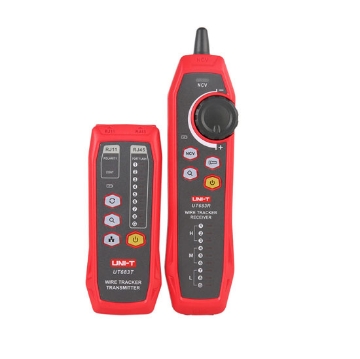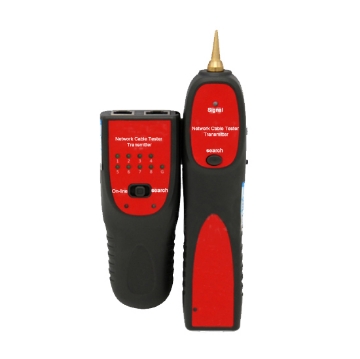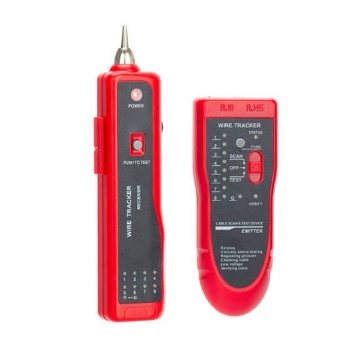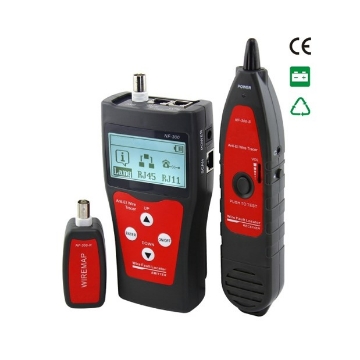Network Cable Testers
Network/Ethernet Cable Tracer for RJ45, RJ11
Network Cable LAN Tracker Tester, RJ45, RJ11
Network Cable Tester for Lan Phone, RJ45/RJ11
Multifunction Network Cable Tester, RJ45/RJ11
BNC USB Network Cable Tester, RJ45, RJ11
Digital Portable Cable Length Meter
Digital Ultrasonic Cable Length Meter
A network cable tester is a portable electronic device designed to inspect the physical connection status, electrical performance, and fault location of network cables (typically Ethernet cables, such as twisted-pair cables). Simply put, it acts like a "physical checkup doctor" for network cables. It's widely used in network cabling construction, network maintenance, and equipment debugging, helping technicians quickly locate network cable faults and ensure stable and reliable network connections.
Network cable tester is an essential tool for network technicians and IT professionals to diagnose and troubleshoot network connectivity issues. This compact and easy-to-use tester can quickly detect wiring faults, cable continuity, and cable length measurement. It supports various types of cables, including CAT5, CAT5e, and CAT6, and comes with an LCD screen that displays test results in real-time. Whether you're working on a small office network or a large data center, this versatile tester can help you identify and resolve network problems quickly and efficiently.
The core functions of a network cable tester revolve around the connectivity and performance of network cables, including:
Connectivity testing: Verifies the correct wiring sequence at both ends of the cable to prevent crossed pairs, shorts, or breaks. Tests the continuity of each core wire to identify problems like broken wires and poor contact.
Fault location: Locates the specific location of broken wires, shorts, or crossed wires. Identifies problems like poor crimping of network connectors and faulty intermediate connectors.
Basic performance testing: Verifies that the transmission rate of the network cable meets standards. Some models can also test electrical parameters such as attenuation and crosstalk to assess cable quality.
What are the commonly used network cable types?
Network cables are an essential transmission medium for network communications. Common types are categorized into three main types: twisted pair, coaxial cable, and fiber optic cable. Twisted pair is widely used in home and business LANs due to its cost-effectiveness and ease of installation.
Basic types such as Category 3 and Category 4 have largely been phased out. The former supports 10 Mbps, while the latter offers slightly higher speeds but has not become mainstream, remaining only in older cabling. Currently, Category 5e (Category 5e) is the most popular type, offering a 100 MHz bandwidth and stable support for Gigabit Ethernet (1000 Mbps). Its low cost and balanced performance make it a popular choice for home and small- to medium-sized office networks, meeting the needs of everyday broadband, IP cameras, and other devices.
Advanced high-performance network cables are represented by Category 6 and Category 6a. Category 6 offers an increased bandwidth of 250 MHz, supports 10 Gbps within 55 meters, and stable Gigabit within 100 meters. Its cross-core structure reduces crosstalk, making it suitable for medium- to large-scale offices or for high-definition video transmission. Category 6a (Category 6a) offers a bandwidth of 500MHz and supports a stable 10Gbps over a distance of 100 meters. Its shielding design offers excellent interference resistance and is commonly used in enterprise 10G LANs and data centers.
Higher-spec Cat7 and Cat8 cables are designed for ultra-high speeds. Cat7 offers a bandwidth of 600MHz and a fully shielded design, supporting 10Gbps and even 40Gbps over short distances, making it suitable for environments with high electromagnetic interference. Category 8, currently the highest specification, boasts a bandwidth of 2000MHz and supports 25Gbps/40Gbps over a distance of 30 meters. It is designed for short-distance, high-speed connections in data centers. Choosing a cable depends on the specific scenario: For home use, consider Category 5e or Category 6 for cost-effectiveness. For businesses requiring high bandwidth, consider Category 6a or higher. Shielded models are preferred for environments with high interference.
Looking for a reliable and affordable network cable tester? Look no further than our comprehensive range of testers that are designed to meet the needs of professionals and DIY enthusiasts alike. sisco network cable testers are easy to use and provide accurate results, making them an essential tool for anyone working in the IT industry.







